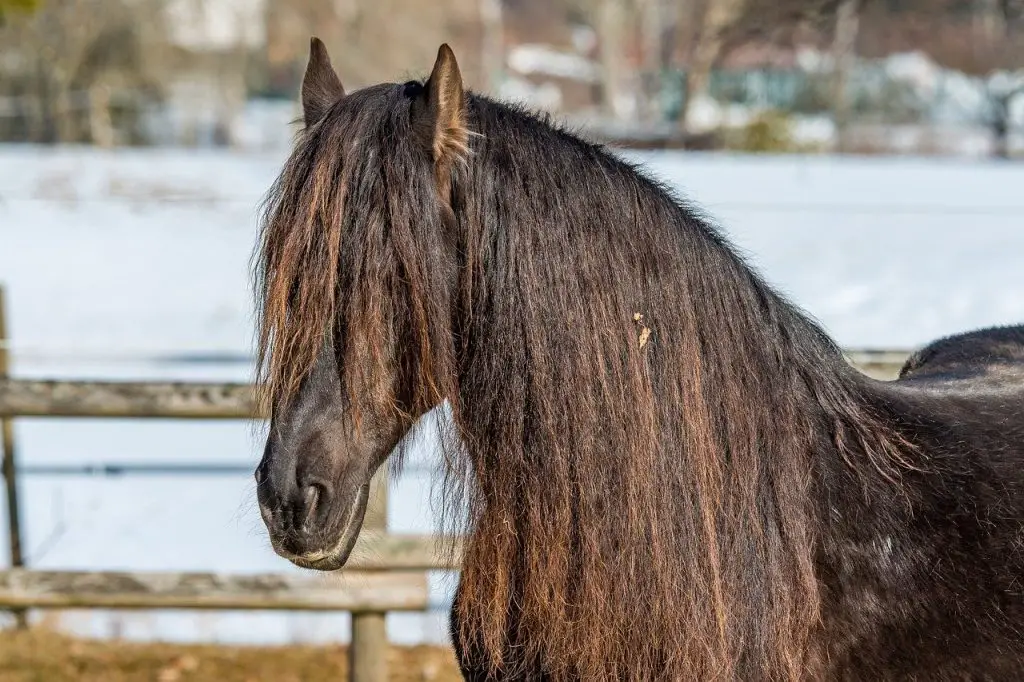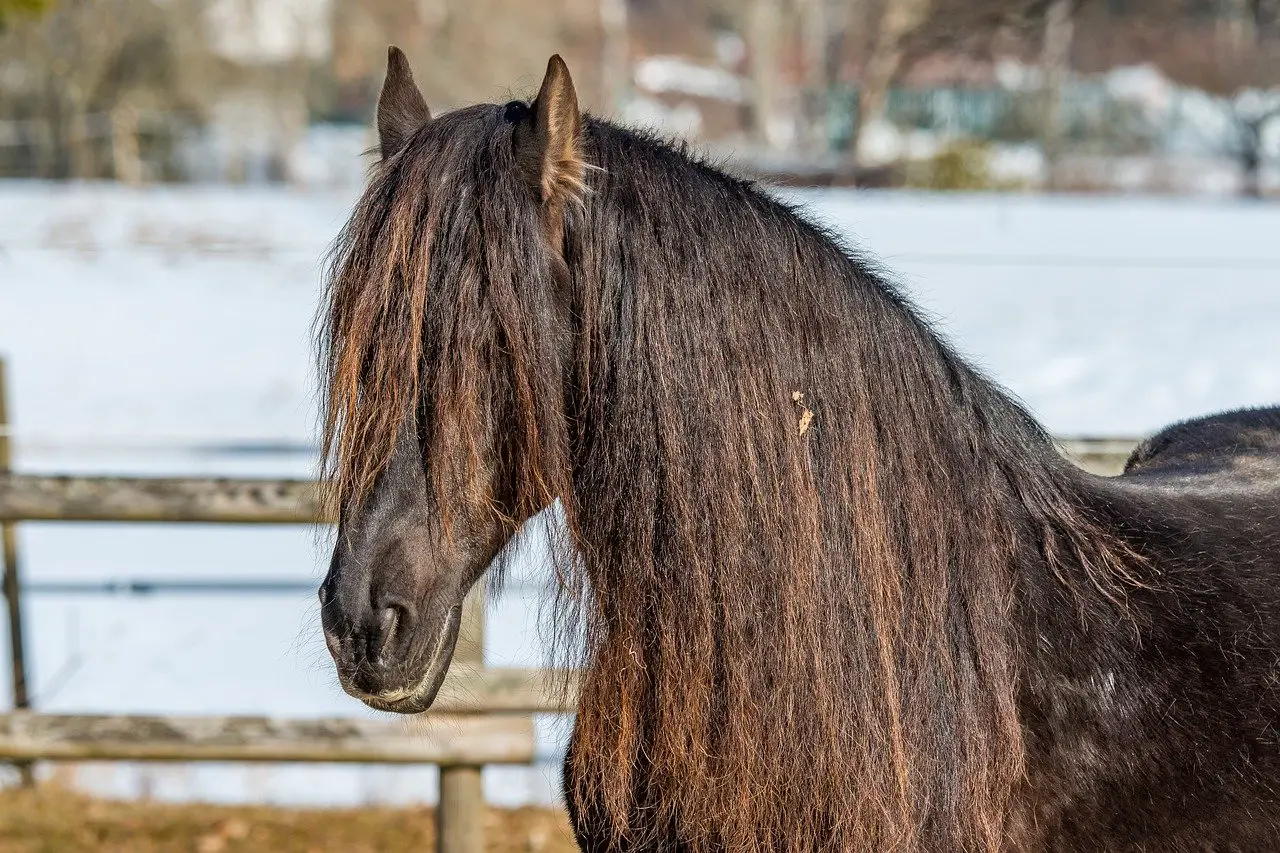Last Updated on April 5, 2022 by Allison Price
Weight loss can simply be explained by the body using more calories than it consumes. There are many possible causes for chronic weight loss in horses. These include poor quality feed, limited supply, health problems, and social interaction. Starvation can also lead to chronic weight loss. Starvation can also be caused by ignorance, intentional neglect, economic hardship, disease, dentition and pecking order, parasites or seasonal variations in pasture availability. Horses can survive long-term weight loss, which is remarkable. Horses can lose up to 30% of their body weight, and still live. This condition can lead to a horse’s weakness and very little muscle mass. To return to their normal body condition, they will require special care and a solid nutrition program. Horses that have lost more than 50% of their body weight will not survive even with the best care.
What causes weight loss?

Low Quality or Poor Feeding
Poor quality feed is the leading cause of weight loss. Poor quality or limited feed plays an important role in chronic weight loss as it is the main component of the diet. It is also difficult to determine the quality of pasture and hay. This means that a person might provide enough forage to their horse, but not enough that the horse can properly digest it. Horses should have access to better quality forage if they are losing weight and having no choice but to eat as much as possible. A grain concentrate can also be used to supplement the nutrients lost in low-quality forage. Another common error in feeding horses is not providing enough food. An adult horse needs at least 1.5% of its body weight daily (15 lb hay per 1000 lb horse) in dry food. Horses that are fed less than this amount will experience weight loss.
Health & Disease
The topics of health and disease cover a wide range of topics, including dental problems, parasite infestation, diseases such as lameness and COPD, Cushings and Gastric Ulcers and Equine Infectious anemia.
Horses can lose weight due to dental problems. Horses that cannot chew properly will not be able use the nutrients in their feed. A horse could have problems with their teeth by dropping food while chewing, causing nasal discharge, bad breath, and swellings on the face. You should do more than just examine the teeth. Other diseases may also be present in the horse’s mouth.
Horses can lose weight due to internal parasites such as worms. Some parasites can become resistant to common de-wormers. Your vet should check your horse’s feces for eggs and make sure you are aware of any potential problems. Lung parasites can still be present even if routine fecal analyses are not performed. Treatment may be necessary to stop chronic weight loss.
Weight loss can also be caused by chronic diseases or other health issues. Weight loss is common when a horse has a disease. Horses that have high levels of protein or energy will often experience weight gain. To help horses recover from the disease or other health problem and gain weight, they must be treated.
Social interaction
Horses can be aggressive towards each other, as many horse owners know. You have to consider the natural hierarchy of dominance when group feeding horses. You may have to push smaller, less confident horses away from your feeders. They could also be suffering stress levels that can cause them to expend more energy and lead to problems such as stomach ulcers or colic. It is essential that horses who are underweight be fed separately. This will ensure that they receive the correct amount of feed.
Monitoring Weight Loss
A proper assessment of the horse’s weight and condition is necessary before any nutritional intervention can be implemented. A key part of any horse management program should include an estimate of the horse’s body weight and condition on a regular basis (i.e. monthly). The owner can track the horse’s weight to determine the feed needed to maintain, gain or lose weight. It will also indicate how much weight has been lost or gained in a given time period.
Three simple methods can be used to measure body weight. While a large livestock scale is the best method for weight estimation, a weight tape can also be very useful. A simple measuring tape can be used if you don’t have a weight tape. The horse’s heart girth should be measured. Next, measure the horse’s length from the point of his shoulder to the point at the buttock. The following equation can be used to calculate body weight (Carroll & Huntington 1988).
Weight=(Heart girth (in) * Heart girth (in) * Length (in))
Divided by 330
The Body Condition Scoring (BCS), which is a tool for estimating body fatness, can also be used. The assessment of body condition involves visual and palpable evaluation of various areas of the horse’s fatness, including the ribs and tail area, neck and withers, as well as behind the shoulders (Henneke and al. 1983). The scoring system is based on a numerical scale from 1 to 9, where 1 indicates emaciated, and 9 indicates obesity. Regular condition scoring will assist in identifying weight loss patterns in horses before they become chronic.
Weight Gain Strategies
After you have identified the root cause of chronic weight loss in your horse, it is time for you to implement feeding strategies to increase weight gain. According to the 2007 National Requirements for Horses, it takes 35 to 45 lbs to increase a horse’s body condition score by one unit. This is based on a 1100lb horse. This amount of weight can be safely achieved in 60 days by simply adding calories to the diet. You should be careful not to cause digestive problems by increasing the feed intake for weight gain. So, the question is “What should I feed my horse to gain weight?”
To increase horses’ weight, there are many ingredients we can add to their diet, including oats and rice bran. To achieve desired weight gain, it is important to know the calories in each ingredient (Table 1). Table 1 shows how much each of the calorie sources should be fed for a 40 lb horse of average size (1100lb). This is in addition their regular diet. If the horse is currently receiving 15 lbs of hay and 4 lbs of sweet food, and you choose to feed beet pulp instead of hay, you will need to give your horse 4.7 lbs (before soaking weight) to gain approximately 40 lbs.
Table 1. Table 1.
| INGREDIENT | DE MCAL/LB | ADDITIONAL LBS/DAY |
|---|---|---|
| E-TEC Fibre-Max | 1.5 | 4.0 |
| Rice Bran | 1.4 | 4.3 |
| Beet Pulp (no molasses) | 1.3 | 4.6 |
| Alfalfa Hay | 1.0 | 6.0 |
| Oil | 4.6 | 1.3 |
We recommend increasing the quantity and quality of the forage available to horses. Alfalfa hay or chaff pellets can increase the horse’s calorie intake and provide other vital nutrients like amino acids, minerals, and chaff. The next step is to increase the amount of grain in the diet. This must be done carefully so as to not cause digestive problems. Next, we can top-dress the grain with a fat supplements or slowly switch horses to a high fat concentrate.
Horse feeds often contain fats and oils to increase the calorie count or replace carbohydrates. Fat supplementation can provide calories for weight gain as well as essential fatty acids that improve skin and coat condition. Vegetable oil gives horses 2.5 times more digestible energy than corn, and almost 3 times as much energy as feeding oats. The energy density, or number of calories per pound, is increased by adding fat to horses’ diets. The diet should be balanced with the feed. If the diet is rich in fat, thin horses can gain weight without eating as much grain.
Horses can lose weight for many reasons. Once you resolve those issues and have your horse on a higher calorie diet, they will start to gain weight. Weight gain takes time and you should not expect quick results.


